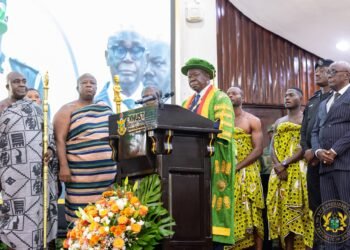In the annals of Ghanaian politics, the pre-election blitz of infrastructural projects has become a hallmark of political strategy.
The tradition of commencing infrastructural projects during election periods is not new. It dates back decades and has been a key feature of the governance system in Ghana.
Successive governments, irrespective of their political affiliations, have employed this tactic to curry favor with the electorate as polling day approaches.
Political leaders have often sought to create a visual impact on voters by initiating projects that signal development and progress.
However, these projects are frequently launched without a reliable financial foundation, leading to a systemic issue where many are abandoned once the elections are over.
In most instances, these projects serve as mere political tools rather than genuine development initiatives. They are started with much fanfare and often without thorough planning or secured funding.
This has created a cycle where communities are left with incomplete structures and unfulfilled promises.
The lack of continuity and commitment to seeing these projects through to completion reflects a troubling trend of prioritizing short-term political gains over long-term development.
Dr. Kwame Asiedu Sarpong, the Democracy and Development Fellow at the Ghana Centre for Democratic Development (CDD-Ghana), in a scathing critique of the practice, underscored its negative consequences on the country’s development.
He, among several things, underscored the detrimental ramifications of the practice, pointing out that the government’s sudden flurry of projects ahead of the December 7 polls is a clear attempt to sway voters.
While the acceleration of development projects might seem like good news, Dr. Sarpong urged Ghanaians to approach this with skepticism, drawing on recent examples such as Kumawu, Assin North, and Ejisu by-elections.
In these areas, the Democracy and Development Fellow at the Ghana Centre for Democratic Development contended that projects were enthusiastically commenced or revived in the lead-up to elections, only to be abandoned promptly afterward.
Dr. Sarpong referenced instances where equipment was moved out on the very day of the election, underscoring the purely political motivation behind these efforts.
“Then there are the roads that started in Greater Accra in 2020 before those elections that were abandoned and have been restarted this month after residents have driven on dilapidated roads for the entire second term of this government”.
Dr Kwame Asiedu Sarpong, Democratic and Development Fellow at the Ghana Centre for Democratic Development (CDD-Ghana)
This pattern, according to Dr. Kwame Asiedu Sarpong, reveals a calculated manipulation of voter gullibility by the ruling government.

A Fervent Call to Action and Vigilance
Dr. Sarpong, in a fervent call to action, urged Ghanaians not be swayed by these superficial, last-minute projects.
Instead, he urged Ghanaians to critically assess the government’s track record and make electoral decisions based on the actual state of affairs in their communities.
He cited the recent example of Assin North, where voters accepted campaign funds but voted based on their lived realities, asserting that the choice of voters during the Assin North by-election serves as a poignant reminder of the power of an informed electorates.
It is imperative to mention that the consequences of this election-year project frenzy are dire as it has the potency of eroding public trust in government.
For instance, when citizens see projects spring up only to be neglected post-election, their faith in the government’s commitment to genuine development wanes. This breeds cynicism and disengagement, weakening the democratic process.
Additionally, these abandoned projects represent a significant waste of resources. Funds allocated to these initiatives are essentially squandered when projects are not seen through to completion.
This not only hampers the specific communities where projects are left unfinished but also detracts from the overall national development agenda.
In conclusion, the perennial practice of election-year project commencements is a deceptive dance that undermines Ghana’s developmental goals.
While these projects might provide short-term visual appeal, their lack of sustainability and secure funding often leads to long-term disappointment and wasted resources.
READ ALSO: ECG Reports Massive GH¢10.21 Billion Loss























